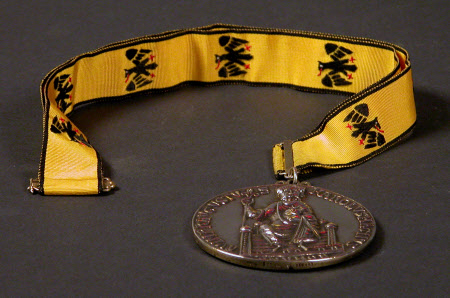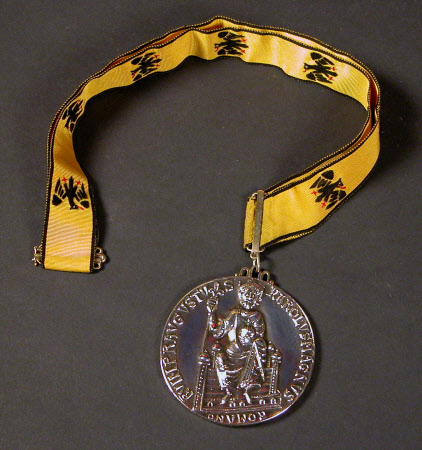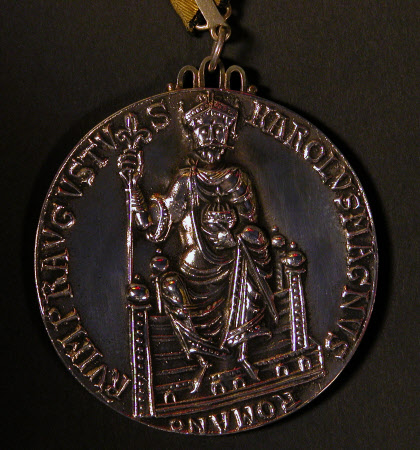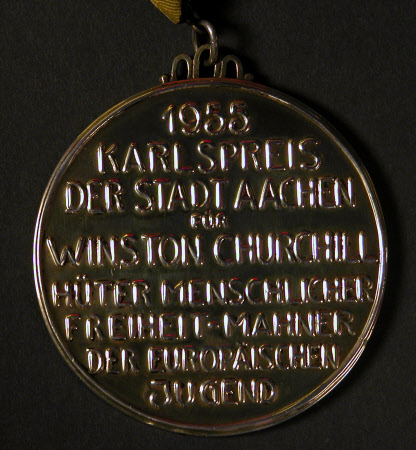City of Aachen Charlemagne prize medal
Category
Coins and medals
Date
1955
Materials
Gold and textile
Measurements
95 x 85 x 8 mm
Order this imageCollection
Chartwell, Kent
NT 1101120
Summary
Gold medal attached to a yellow ribbon patterned with the simplified eagle of the Aachen coat of arms. Awarded as the 1955 International Charlemagne Prize of the City of Aachen to Sir Winston Leonard Spencer Churchill (1874 - 1965). Formally identified as the City of Aachen freedom award. Front of medal depicts an enthroned figure of Charlemagne, surrounded by the words “HAROLUSMAGNUS ROMANO RVIMPR AUGUSTUS", design based on the medieval seal of Aachen. Chartwell also holds the accompanying City of Aachen Charlemagne Prize Award Certificate (NT 1101135).
Full description
The Charlemagne Prize, or Karlspreis in German, is a prestigious European prize awarded for work supporting European unification. It was proposed by Kurt Pfeiffer in 1949 as an ‘annually awarded prize' for either 'the most valuable contribution to West European understanding’ or for ‘services of humanity and world peace’ and has been awarded annually at Aachen since 1950. It was renamed to the Internationaler Karlspreis zu Aachen or, in English, the International Charlemagne Prize of Aachen from 1988. It commemorates Charlemagne, ruler of the Frankish Empire and founder of what became the Holy Roman Empire, who resided and is buried at Aachen. In 1955, Churchill was awarded the prize for his “appeal to young people to safeguard the future of Europe through unification”. This was demonstrated in his 1946 speech at the University of Zurich, where he called for “a kind of United States of Europe” to which Britain would remain a “friend and sponsor”. Churchill’s visit to receive the prize was his first visit to Germany since 1945, and only his second since 1932. Although awarded for 1955, Churchill received the prize inside Aachen Town Hall on 10 May 1956, due to illness the prior year. The date was sixteen years to the day since he had become Prime Minister in the war against Germany. Lord Moran noted that the fact “That he, chief architect of Germany’s downfall, should be their guest excites him, but he is bothered by his speech for Aachen” (Gilbert, p.1197). His aim in his speech at Aachen was two-fold; to urge upon the Germans a receptiveness to any possible relaxation in Soviet policy, and at the same time to warn them not to be too hasty in their desire for reunification. Montague Browne drafted the speech that Churchill delivered. “It was his own idea”, Montague Browne later recalled, adding “it struck a chill”. In the speech Churchill called for continued détente and for European unity with an end to ‘bloc’ politics. There is a British Pathé film of the event with Churchill wearing the medal around his neck. From Aachen, Churchill travelled to Bonn to meet Federal Chancellor Konrad Adenauer, winner of the 1944 Charlemagne Prize. Adenauer had praised Churchill in his laudatory speech, highlighting Churchill's “special services to European unification” by calling for a "vision of the future" where Europe might "join forces and unite". There is a large file of material relating to this award in the Churchill Archive including the following resources: Printed programme for Churchill's visit to the Federal Republic of Germany [in English and German]; Drafts of itinerary; Letter from Otto Suhr, Burgermeister of Berlin, inviting him to visit the City; Letter from Anthony Head, Secretary of State for War to John Colville, PS to Winston Spencer Churchill, asking Winston Spencer Churchill to visit British troops during visit to Germany; Letter from the Federal Chancellor, Konrad Adenauer, enclosing letter from Hermann Heusch, Oberburgermeister of Aachen, asking if he would be willing to accept the International Charlemagne Prize for services to the Unity of Europe; Letters from Colonel G A F "Loopy" Kennard, 4th Queen's Own Hussars to Winston Spencer Churchill, on his visit as Colonel of the Regiment (2); Text of the speech of Alcide De Gasperi accepting the Charlemagne Prize in 1952 [in German] and Jean Monnet accepting the prize in 1953 [in English, French and German]; Text of address by Konrad Adenauer, on the award of the Charlemagne Prize to Winston Spencer Churchill, Aachen, 10 May 1956; Pamphlets on the city of Aachen; Official memorandum by Sir Frederick Hoyer Millar (later Lord Inchyra), British Ambassador, Bonn, on "Leading Personalities in Germany", July 1955, with comments on more than 200 leading personalities in the German Federal Republic, Berlin and the Soviet Zone of Germany (printed, WG 1012/1); Foreign Office Telegram from Sir William Hayter, British Ambassador, Moscow, "Calendar of Events in the Soviet Union for the First Quarter of 1956", Apr 1956 (printed, NS 1015/88); Foreign Office Telegram from Sir Frederick Hoyer Millar (later Lord Inchyra), British Ambassador, Bonn "Assessment of Dr Adenauer's position in the German Federal Republic", Apr 1956 (printed, WG 10114/38); Foreign Office note on the German political scene, and notes on some of the important people who would be in the audience at presentation ceremony in Aachen. Other Files contain press cuttings and Speech notes and typescript for Winston Spencer Churchill's speech (10 May, Aachen, Germany) entitled "Grand Alliance of European Powers", on receiving the Charlemagne Prize, on subjects including: the success of the previous prize-winner, Konrad Adenauer, Federal Chancellor; the original founding of Charlemagne's empire; changes in Germany since the war, particularly the reconciliation of West Germany with Britain and the United States, and the founding of NATO for the further unity of Europe, including France and Germany; the need to support France in North Africa; the main principle of NATO of unity against aggression; hopes for the Soviet Union to join as part of a united Europe, and for a free Czechoslovakia and reunified Germany; the importance of NATO avoiding violence and apathy; the effectiveness of a resolute defensive front in Western Europe.
Marks and inscriptions
Front of Medal: Inscribed: "HAROLUSMAGNUS ROMANO RVIMPR AUGUSTUS" Back of Medal: Inscribed: "1955 KARLSPREIS DER STADT AACHEN FÜR WINSTON CHURCHILL HÜTER MENSCHLICHER FREGEIT-MAHNER DER EUROPÄISCHEN JUGEND"
Exhibition history
Very British! A German point of view, Zeitgeschichtliches Forum Leipzig, 2019 - 2021 Very British! A German point of view, Stiftung Haus der Geschichte der Bundesrepublik, Bonn, Germany, 2019 - 2021
References
Rösgen 2019: Petra Rösgen (ed.), Very British: A German Point of View (exh. cat), trans. David R. Ward, Stiftung Haus der Geschichte der Bunderepublik Deutschland, 2019, p. 19 (illustrated)



